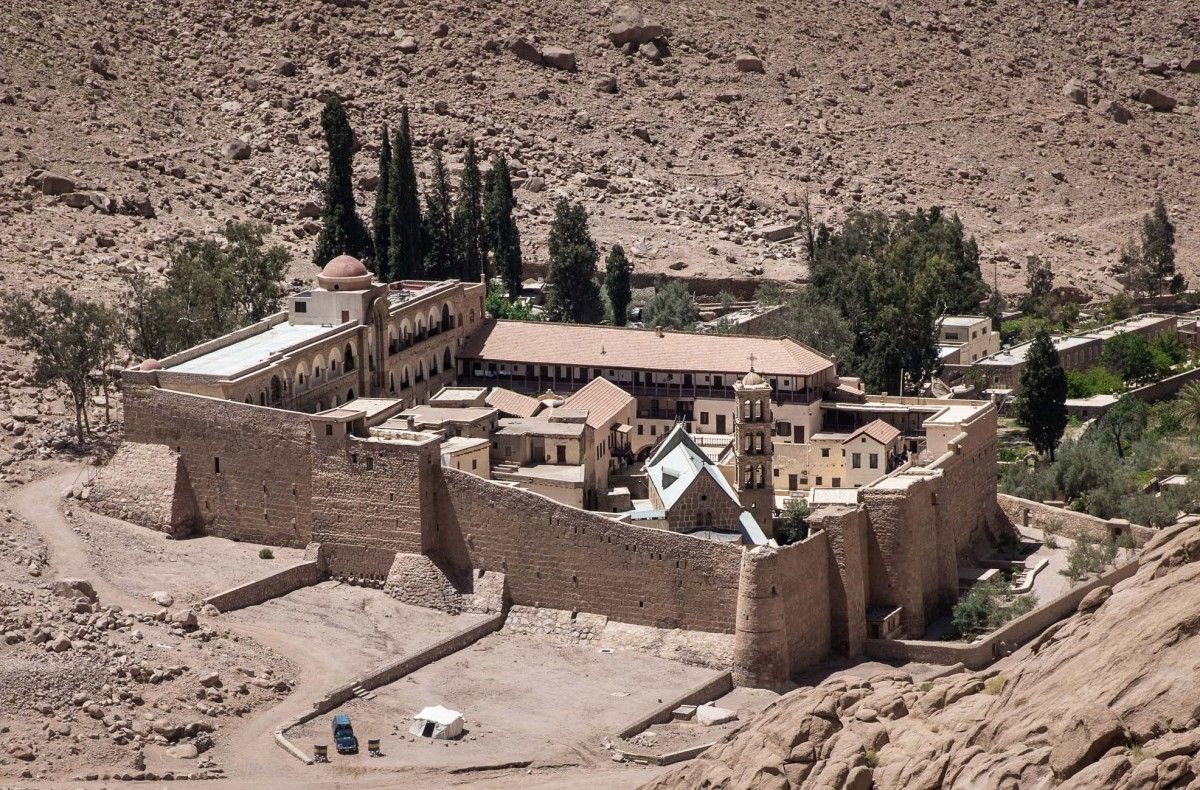- Home
- Middle East
- Egypt Denies Court Ruling Threatens Historic Monastery

This picture taken on April 16, 2017 shows a general view of the Monastery of Saint Catherine in Egypt's south Sinai. ©Pedro Costa Gomes / AFP
Egypt and Greece sought to ease tensions over the historic St. Catherine's Monastery in the Sinai Peninsula on Friday after a controversial court ruling said it sat on state-owned land.
Cairo has denied that the ruling threatens the UNESCO World Heritage landmark, a pilgrimage, and tourism site, after Greek and church authorities warned the sacred site's status was at risk.
St. Catherine's Monastery was established in the sixth century at the biblical site of the burning bush in the southern mountains of the Sinai Peninsula, and is the world's oldest continually inhabited Christian monastery.
A court in Sinai ruled on Wednesday in a land dispute between the monastery and the South Sinai governorate that the monastery "is entitled to use" the land and the archaeological religious sites dotting the area, all of which "the state owns as public property".
The ruling comes with a government development project underway to boost visitor numbers to the area, which is popular with pilgrims and adventure tourists looking to climb Mount Sinai.
But on Friday, in a phone call with Greek Prime Minister Kyriakos Mitsotakis, Egyptian President Abdel Fattah al-Sisi said Cairo was "fully committed to preserving the unique and sacred religious status of Saint Catherine's Monastery and ensuring it is not violated".
The Greek premier's office said Mitsotakis emphasized the importance of "preserving the pilgrimage and Greek Orthodox character of the monastery and resolving the issue in an institutional manner", based on an agreement between the two countries.
A Greek delegation is due to visit Egypt next week, the government in Athens said.
Sisi's office has defended the court ruling, saying that it "consolidates" the site's sacred status, after the head of the Greek Orthodox Church in Athens denounced it.
Archbishop Ieronymos of Athens called the court ruling "scandalous" and an infringement by Egyptian judicial authorities on religious freedoms.
Tourism Development
The Saint Catherine area, which includes the eponymous town and a nature reserve, already a popular tourist site, is undergoing major development under a controversial government project aimed at ramping up visitor numbers.
Observers say the project has harmed the reserve's ecosystem and threatened both the monastery and the local community.
Archbishop Ieronymos warned that the monastery's property would now be "seized and confiscated", despite "recent pledges to the contrary by the Egyptian president to the Greek prime minister".
The ruling has drawn the condemnation of the region's other Greek Orthodox patriarchates in Jerusalem and Istanbul.
The Greek Orthodox Patriarchate of Jerusalem said in a statement on Friday that it was "deeply troubled" and asserted its jurisdiction over and protection of the monastery.
It said the monastery was granted a letter of protection from the Prophet Muhammad in the seventh century, which was reaffirmed by the Ottoman Sultan Selim II in the 16th century.
The Ecumenical Patriarchate of Constantinople said it was "disappointed and saddened" by the ruling and called on the Egyptian government to respect longstanding tradition and agreements with the monastery.
In a statement to Egypt's state news agency, the foreign ministry in Cairo later said rumors of confiscation were "unfounded", and that the ruling "does not infringe at all" on the monastery's sites or its religious and spiritual significance.
Greek government spokesman Pavlos Marinakis said "Greece will express its official position ... when the official and complete content of the court decision is known and evaluated".
He confirmed both countries' commitment to "maintaining the Greek Orthodox religious character of the monastery".
With AFP
Comments